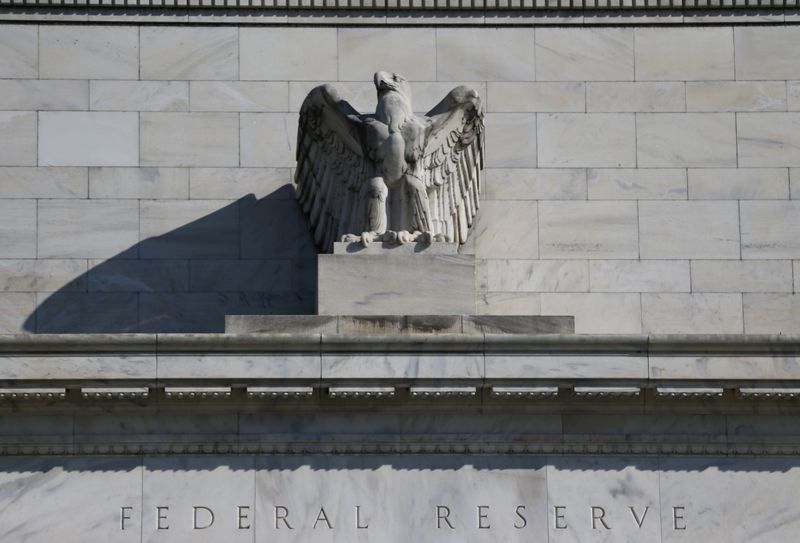(Reuters) – There is little chance the U.S. Federal Reserve will take interest rates into negative territory even as financial markets have begun pricing in such a move for the first time, fund managers and economists said on the Reuters Global Markets Forum.
Fed funds futures, which are a gauge of where markets expect the Fed’s benchmark overnight lending rate to be, are now pricing in a slightly negative rate environment beginning in December. <0#FF:>
Under a negative rate policy, financial institutions are required to pay interest for parking excess reserves with the central bank. Excess reserves refer to surplus cash beyond what regulators say banks must keep on hand. That way, central banks penalise financial institutions for holding on to cash in the hope of prompting them to boost lending to businesses and consumers.
The European Central Bank (ECB) introduced negative rates in June 2014, lowering its deposit rate to -0.1% to stimulate the economy.
The Bank of Japan (BOJ) adopted negative rates in January 2016, mostly to prevent an unwelcome strengthening of the yen from hurting an export-reliant economy.
Following are excerpts from interviews on the Reuters Global Markets Forum:
JIM WALKER, CHIEF ECONOMIST, ALETHEIA CAPITAL, HONG KONG (MAY 6):
“The talk – among the monetary cranks, of whom there are many, is of Yield Curve Control [by the Fed]. Not impossible by any means. It is just the case that central banks are all-in on a crisis that they themselves have created. The Bank of Japan has been running zero to negative interest rates for 30 years and is lucky if it averages 1% nominal growth.
The Fed has managed to encourage both government and corporates to build debt since 2007 which means we start again in a highly overindebted position.
The IMF estimated in October last year that a downturn half the size of the global financial crisis would result in $19 trillion in possibly failed corporate debt-at-risk, 40% of major economies’ corporate debt. This is what happens when interest rates are suppressed for long periods of time. So more of the same can keep the corpse ‘alive’ but it is akin to ‘The Walking Dead’.
The Fed isn’t in negative territory and has said it won’t go there – it just does balance sheet expansion instead. Money market funds would collapse in the U.S. if they had to input negative rates.”
MARK KONYN, GROUP CIO, AIA, HONG KONG (MAY 7):
“Some would say they (the Fed) have done quite enough. And we have seen some moderation since the initial programs were launched. Keeping companies afloat and the employment market positioned for recovery has been key, and at great cost. Efforts to support the high yield and securitization markets will be a point of focus. The latter feed through to the consumer directly. The debate has moved now to the longer-term impact of government debt and central bank balance sheet expansion.
No. The Fed will be very reluctant for target rates to go negative.”
MARK MOBIUS, EMERGING MARKETS FUND MANAGER AND FOUNDER AT MOBIUS CAPITAL PARTNERS, MUNICH (MAY 7):
“It would be very unlikely for them to cut into negative territory. A significant segment of the American population has their life savings in bank accounts, not in stocks or bonds or funds, and if they get into negative rates, there will be incredible political consequences. People are already concerned about low rates of interest they are getting in the bank. The whole economic system is being distorted as a result of these moves by central banks. In Japan, they are buying government bonds, corporate bonds, ETFs, stocks. This is getting completely crazy.”
PETER CARDILLO, CHIEF MARKET ECONOMIST, SPARTAN CAPITAL, NEW YORK (MAY 4):
“We are already experiencing negative rates and we will stay here for a while. The Fed is clear it will stay here till the economy needs no more crutches. (Fed Chair Jerome) Powell has been vocal in stressing that they will do everything and has told lawmakers not to worry about deficits. And that is a sign that the Fed is really worried about the economy and they are doing everything to stop a long-term recession/depression as we experienced in the 1930s.
“I suspect we will have some sort of recovery in the fourth quarter of this year and going into the first quarter (of 2021). If things really get worse, there is a possibility that the Fed may do a BOJ and buy equities. But that would be a remote possibility.”
(Reporting by Divya Chowdhury; Editing by Kim Coghill)























